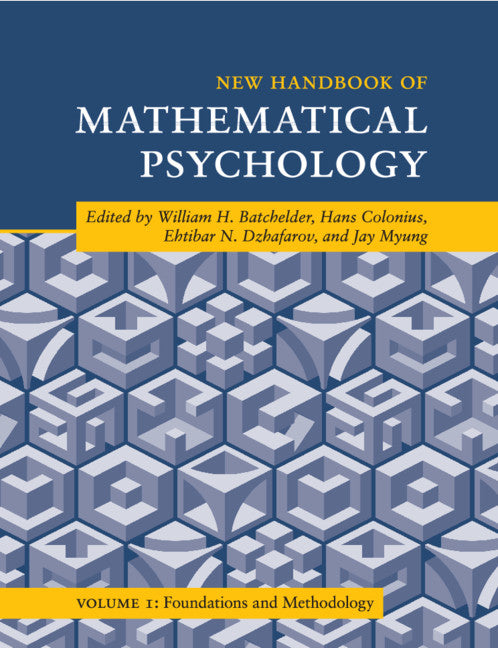Freshly Printed - allow 8 days lead
Couldn't load pickup availability
New Handbook of Mathematical Psychology: Volume 1, Foundations and Methodology
Shows how foundational mathematical ideas can be employed in the understanding of a variety of psychological phenomena.
William H. Batchelder (Edited by), Hans Colonius (Edited by), Ehtibar N. Dzhafarov (Edited by), Jay Myung (Edited by)
9781108717311, Cambridge University Press
Paperback / softback, published 24 January 2019
623 pages, 102 b/w illus. 9 tables
24.7 x 18.9 x 3.2 cm, 1.15 kg
'These two volumes are a valuable contribution to mathematical psychology; partly representing important summaries of special branches, partly pushing the forefront of research towards new horizons. They should be read by all working in special fields, but also by students who are striving for a general point of view. We are looking forward to the third volume.' Reinhard Suck, Journal of Mathematical Psychology
The field of mathematical psychology began in the 1950s and includes both psychological theorizing, in which mathematics plays a key role, and applied mathematics, motivated by substantive problems in psychology. Central to its success was the publication of the first Handbook of Mathematical Psychology in the 1960s. The psychological sciences have since expanded to include new areas of research, and significant advances have been made in both traditional psychological domains and in the applications of the computational sciences to psychology. Upholding the rigor of the first title in this field to be published, the New Handbook of Mathematical Psychology reflects the current state of the field by exploring the mathematical and computational foundations of new developments over the last half-century. This first volume focuses on select mathematical ideas, theories, and modeling approaches to form a foundational treatment of mathematical psychology.
1. Selected concepts from probability Hans Colonius
2. Probability, random variables, and selectivity Ehtibar N. Dzhafarov and Janne V. Kujala
3. Functional equations Che Tat Ng
4. Knowledge spaces and learning spaces Jean-Paul Doignon and Jean-Claude Falmagne
5. Network analysis John P. Boyd and William H. Batchelder
6. Evolutionary game theory J. McKenzie Alexander
7. Choice, preference, and utility: probabilistic and deterministic representations Anthony A. J. Marley and Michel Regenwetter
8. Discrete state models of cognition William H. Batchelder
9. Bayesian hierarchical models Jeffrey N. Rouder, Richard D. Morey and Michael S. Pratte
10. Model evaluation and selection Jay Myung, Daniel R. Cavagnaro and Mark A. Pitt.
Subject Areas: Maths for scientists [PDE], Applied mathematics [PBW], Psychological testing & measurement [JMBT], Research methods: general [GPS]


